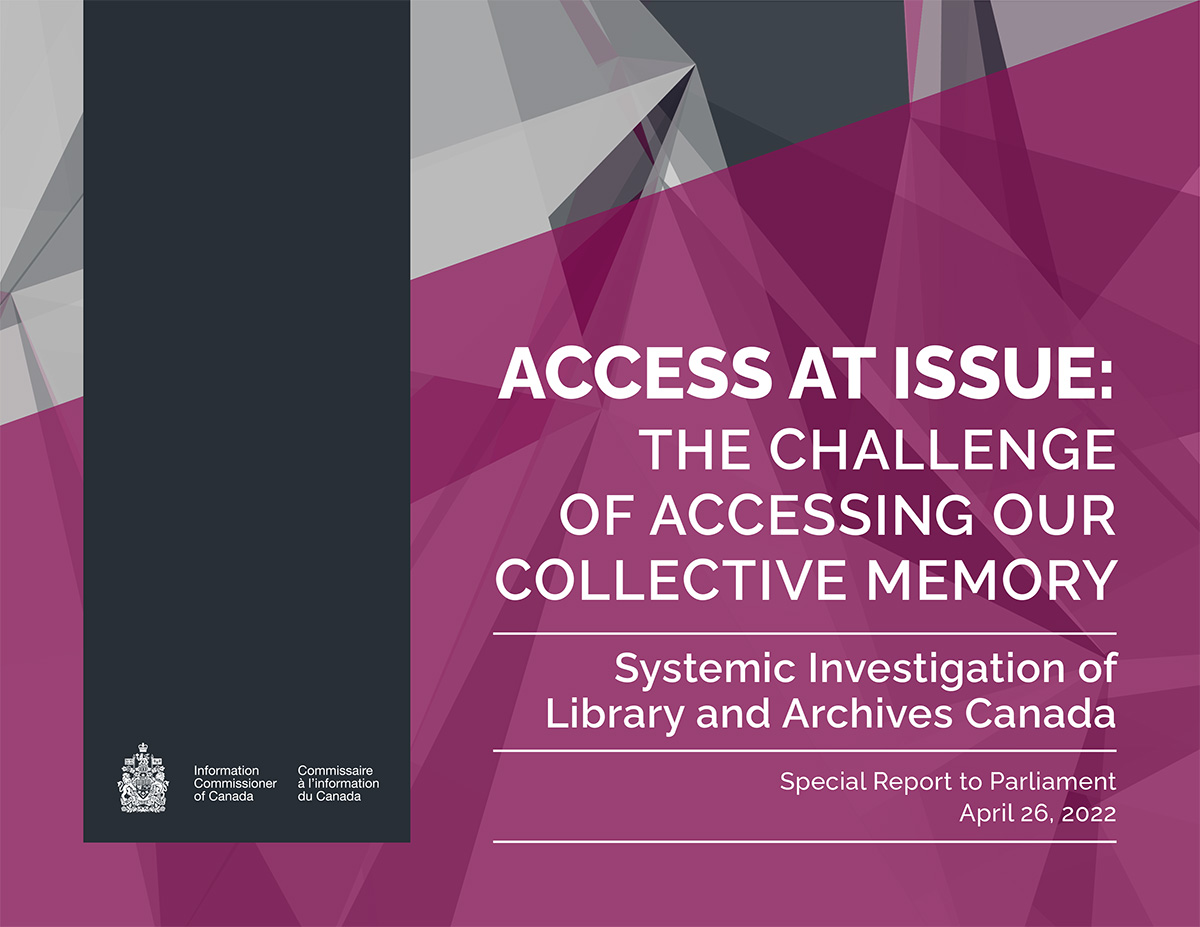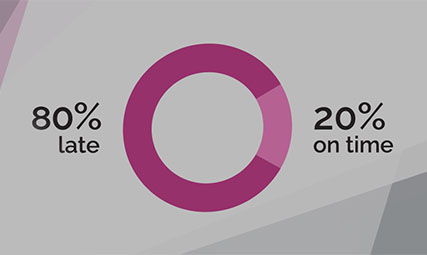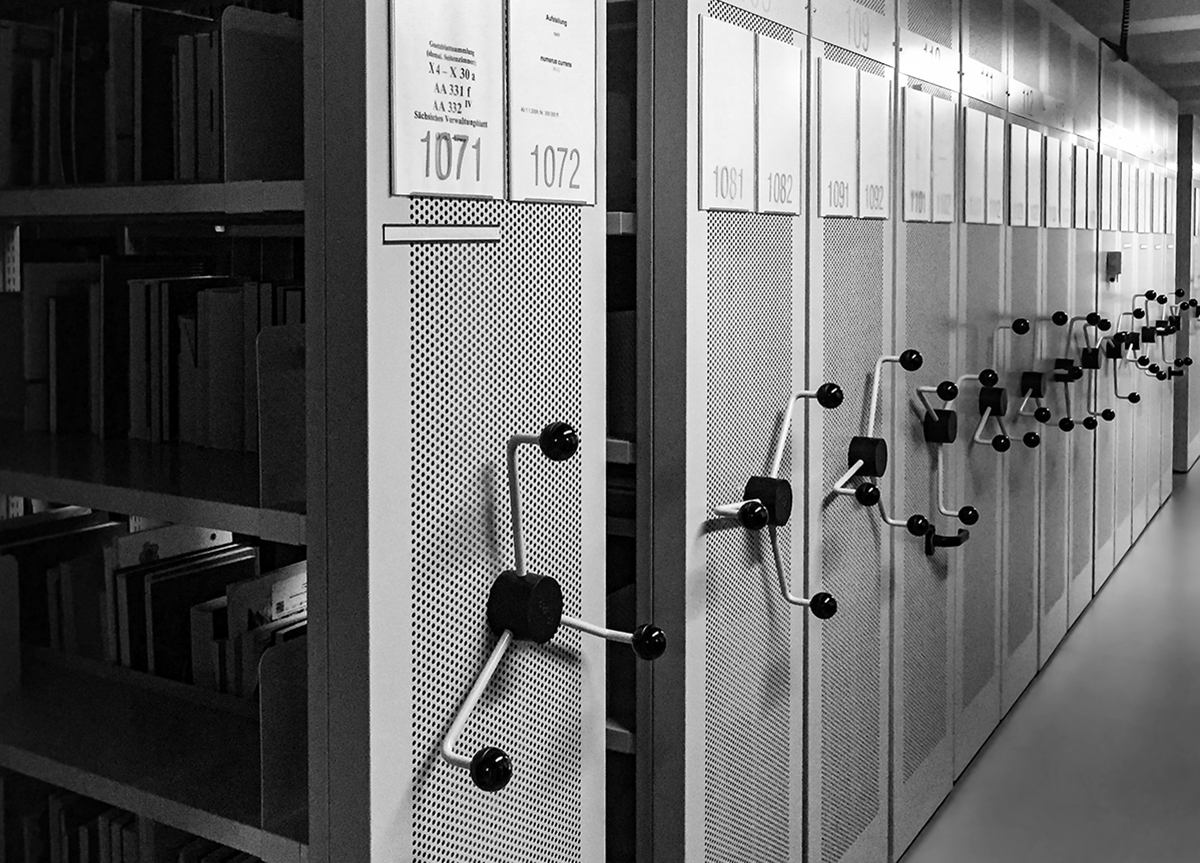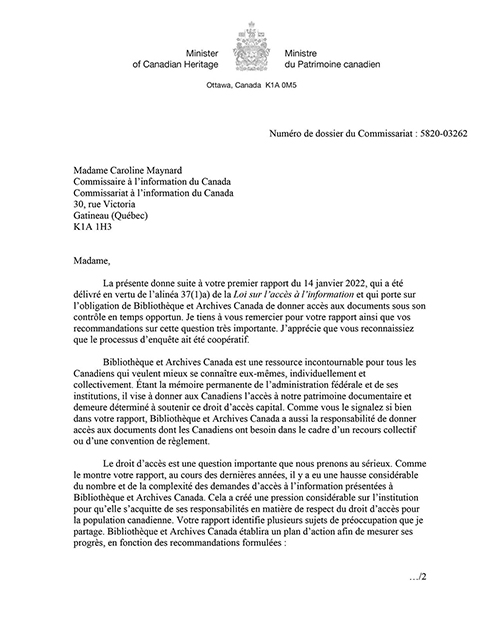Access at issue: The challenge of accessing our collective memory
Systemic Investigation of Library and Archives Canada
Special Report to Parliament
April 26, 2022
Table of contents
- Message from the Commissioner
- Recommendations
- Themes
- Conclusion - Final thoughts from the Commissioner
- Annex - Response from the Minister of Canadian Heritage
Message from the Commissioner
Library and Archives Canada (LAC) acquires, processes, preserves and provides access to Canada’s documentary heritage, and serves as the continuing memory of the Government of Canada and its institutions.
There has been significant and growing public criticism of LAC by journalists, academics and others who decry the excessive wait times and lack of responses that characterize this institution’s management of access requests. Over the last few years, my office has collected evidence through complaint investigations confirming that LAC has not been responding to access requests within legislated deadlines. A somewhat alarming picture begins to emerge as the current situation is further complicated by the stream of new complaints about delayed responses during the COVID-19 pandemic, together with an absence of concrete action by LAC’s leadership to address the underlying problems.
My recent systemic investigation found several issues impeding LAC’s ability to provide access to the information under its control. In particular, the investigation concluded that LAC is not meeting its obligations under the Access to Information Act.
As the minister responsible for LAC, the Minister of Canadian Heritage was made aware of my findings and the 10 recommendations that resulted from this investigation in January 2022.
While the Minister agreed to implement most of my recommendations, I remain disappointed by an apparent lack of engagement to make concrete and positive improvements. The Minister’s response is included as an appendix to this special report; my assessment of his response to my findings and recommendations can be found in the final report of the investigation.
Given the many and varied responsibilities LAC’s Access to Information and Privacy (ATIP) office carries out, my recommendations, if implemented, would enable significant improvements to be made to LAC’s ATIP program, including making the proper resourcing of ATIP operations a higher priority. The Minister’s leadership will be needed in addressing the bleak state of LAC’s access to information program, and in seeing the necessary work through to completion.
Aside from bringing to light numerous issues specific to LAC, this investigation also affords me the opportunity to draw Parliament’s attention to two of the broader challenges facing Canada’s access to information system:
- the manner in which consultations on access requests are conducted between institutions; and
- the lack of a Government-wide framework for the declassification of records.
These two issues create significant backlogs within LAC given its unique mandate but also impact access in many institutions. Both are areas where I had previously signalled that action was required. As timeliness across the system continues to deteriorate, the consequences of inaction can no longer be ignored.
These issues, explored in more detail in this special report, are critical and should be treated as such by Parliament and all institutions subject to the Access to Information Act.

Caroline Maynard
Information Commissioner of Canada
For the period under investigation, almost 80% of the requests completed by LAC did not comply with the time frames set out in the Act.
Text version
Infographic illustrating that 80% of the requests completed by LAC were late, whereas 20% were processed on time.
The challenges that LAC is facing cannot all be addressed through its own actions. I call upon the Government to take a broader perspective in its efforts to improve access to information, and to find solutions that address the root causes of these problems.
- Information Commissioner of Canada
Recommendations
The Information Commissioner made the following 10 recommendations.
The final report concluding the investigation can be found here.
- Direct LAC ATIP officials to use their delegated authority to respond to all access requests with outstanding consultations forthwith.
- Direct LAC ATIP officials, for new access requests requiring consultations, to establish a rigorous process to determine the length of time the consultations should take and to respond to those requests before the expiry of the extension sought, with or without the institutions’ input.
- Process all pending access requests for records classified as Top Secret forthwith, even as implementation and certification of new infrastructure continues.
- Respond to the backlog of access requests that resulted from LAC suspending ATIP operations during the pandemic.
- Implement fully functional infrastructure to allow ATIP officials to process Secret and Top Secret records efficiently.
- Ensure ATIP officials have access to the LAC network and record-processing software at all times, so LAC is always in a position to respond to access requests.
- Require institutions to review and, whenever possible, declassify or downgrade the classification of records prior to transferring them to LAC.
- Negotiate adequate funding for LAC’s ATIP office to support new programs introduced by other institutions.
- Review and adjust the permanent funding for the various units with the ATIP office to reflect their workload.
- Publish on the LAC website by the end of 2022 the concrete results achieved to implement these recommendations and provide quarterly updates.
Themes
For this special report, two issues impacting not only LAC but Canada’s access to information system as a whole are addressed under the following themes:
- Lengthy consultations delay access
- Barriers to transparency arise as a consequence of failing to declassify records
Lengthy consultations delay access
When responding to access requests, one institution may consult another about disclosing records that relate to the second institution for various reasons, including in order to apply necessary exemptions and appropriately exercise discretion to withhold information.
Section 7 of the Access to Information Act requires institutions to respond to access requests within 30 days. Under the Act, institutions may extend the time limit for responding when consultations are necessary to comply with the access request and cannot be completed within the 30-day time limit, provided the extension is reasonable in the circumstances.
Institutions may consult another about disclosing records that relate to them, but are not obligated to do so.
When can consultations be problematic?
The Act does not specify a time limit within which a consulted institution must respond. This is a significant reason why institutions tend to prioritize responding to their own access requests, rather than consultation requests. Ultimately, this results in delays.
LAC plays a unique role as it holds records it did not create
Consultations are a source of delays across the system, but are particularly problematic for LAC.
It is understandable that LAC consults other institutions to get their recommendations on the release of information. For the most part, LAC does not create the records it holds. However, LAC’s expertise in the historical value and meaning of the records in its custody must be recognized. LAC archivists curate collections of historical records, study the events described in the records, publish articles and write books on these events and subjects. Instead of recognizing this expertise and using it to apply necessary exemptions, LAC waits to receive a reply to the consultation request before responding—as do most institutions in this situation as demonstrated in various investigations conducted by the Office of the Information Commissioner (OIC).
When LAC consults, it does not normally frame the advice sought or carve out the specific information for which advice is sought. Such preliminary analysis—with a view to focussing consultations—would improve the ability of consulted institutions to respond within a reasonable time. All institutions are expected to exercise their authority to exempt and disclose records under the terms of the Act, without adding time for unnecessary consultations.
Beyond the systemic investigation of Library and Archives Canada
Since consultations are neither mandatory nor bound by time limits, ATIP officials must be prepared to respond to access requests without input from the consulted institution, if the latter does not provide its recommendations within a reasonable period.
In her January 2021 submission to the Government’s ongoing review of the access to information regime, the Commissioner noted that her investigations have revealed that:
- Even though under the Treasury Board Secretariat’s Interim Directive on the Administration of the Access to Information Act institutions must give the same importance to consultation requests as access requests, institutions generally prioritize responding to access requests that they have received, over responding to consultations from others.
- Institutions establish broad standards for responding to consultation requests amongst themselves. Generally speaking, these standards are solely based on the number of pages at issue in the consultation. The establishment of such standards means that institutions are failing to consider the type of exemption, the sensitivity of the information, and the contents or age of records when setting a reasonable time limit for responding to consultation requests.
In the Commissioner’s view, the Interim Directive on the Administration of the Access to Information Act should also better reflect the non-mandatory nature of consultations under the Act. The Interim Directive must be strengthened to clarify that consultations should take place only when needed and provide guidance on determining whether a consultation is required or not.
The Commissioner reiterates what she stated in her submission to the review of the access to information regime:
The Access to Information Act should provide a clearer process for institutions that decide to have a consultation and set out a maximum length of time for consultations required in order to respond to access requests. Requiring consulted institutions to respond within a specific time frame would help reduce processing times for access requests.
Barriers to transparency arise as a consequence of failing to declassify records
Information is classified to protect Canada’s interests, individuals and assets. Implementing adequate safeguards to ensure classified information is not inadvertently disclosed is costly but essential to the proper functioning of the federal government.
Once information is classified however, there is no legislated requirement to revisit—and thereby downgrade or declassify—the records when the protection is no longer required.
Why declassification matters
An access request can be made for any record under the control of an institution, regardless of its security classification. Information is withheld based on the application of exemptions under the Act and not on its security classification.
However, if a record is highly classified, processing it under the Act is cumbersome and costly as it requires secure infrastructure and rigid processes, and can be handled only by employees with the appropriate security clearance.
By declassifying records when it is reasonable to do so, institutions would allow easier access to information no longer sensitive as declassified records can be more easily processed.
In addition to making a general contribution to transparency, responsibility and open government, declassification and the dissemination of Canada’s important historical national security and intelligence records would alleviate pressure on the access system.
How is the lack of a declassification system affecting LAC?
The security designation of a record does not determine whether information warrants being withheld under, for example, section 13 (confidential information from government bodies) or section 15 (international affairs, national security and defence) of the Act. However, this designation often contributes to overreliance on these exemptions out of an abundance of caution. It also extends the time required to process access requests and to consult other institutions, due to stringent security requirements that heavily encumber every step of the process.
There is no legislated obligation for institutions to review, declassify or downgrade classified records before they are transferred to LAC. As a result, even if the original security implications of releasing the contents of records no longer exist, the lack of a declassification program is contributing to delays when LAC receives access requests for such records.
Canada, Australia, New Zealand, the United Kingdom and the United States form the Five Eyes intelligence alliance. Canada is the only member without a national declassification program.
Some progress has been observed
During the systemic investigation, the OIC learned that an Interdepartmental Declassification Working Group will launch a pilot project to declassify records of the Joint Intelligence Committee dating from 1943 to 1960 and held at a variety of institutions.
In addition, Public Safety Canada, in collaboration with the National Security and Intelligence community, LAC and the Treasury Board Secretariat, is spearheading declassification projects. It remains to be seen if this work will yield tangible results. That said, these initiatives, like other key actions on access currently in the works, are a step in the right direction.
As things currently stand, handling classified information is an extremely complicated and lengthy process. Any initiative that aims at either declassifying or lowering the classification level of documents both facilitates the processing of access requests and enhances access overall.
Ultimately, in order to uphold the right of access, it is essential that the federal government adopt a standardized approach to declassification across institutions in order to render records more easily accessible.
Beyond the systemic investigation of Library and Archives Canada
The Information Commissioner has sounded the alarm on the need for a proper declassification system for Canada on more than one occasion, including during the 2019 Open Government Partnership Summit, where she chaired a panel discussion on declassification. In February 2020, the OIC published a declassification strategy developed by Wesley Wark, who had served as the rapporteur for the panel. This strategy presents 15 recommendations on how Canada could move forward with its own declassification program.
In her foreword to this paper, the Commissioner bemoans the fact that Canada lacks a declassification regime for historical national security and intelligence-related records. The access to information system is ill equipped to be the de facto means by which the sensitivity of historical national security and intelligence related records is to be reviewed.
As a result, many national security and intelligence-related classified records sought through access requests are the subject of complaints to the OIC—and the work involved in investigating these types of complaints is immense.
In the two years since this strategy was presented to the National Security Transparency Advisory Group, the situation has changed very little at the OIC, with 20% of the inventory of 5000 files continuing to be made up of complaints involving this type of records.
The Commissioner reiterates what she stated in her submission to the review of the access to information regime:
National security records often become less sensitive over time. A proper declassification system based on regular reviews and consensus by experts would enable researchers and others to gain access to records that are no longer sensitive to national security, through mechanisms other than the Act. This would alleviate pressure on the access to information regime and achieve a better result for all stakeholders.
Conclusion
Final thoughts from the Commissioner
The failure of any government institution to uphold the right of access is unacceptable, but when the institution is mandated to provide access to our collective memory as Canadians, addressing the problem is all the more urgent. The inability of LAC to discharge its access to information obligations also impairs its ability to fulfill its mandate.
That said, LAC alone is unable to address some of the issues raised by this investigation. This is why I have brought particular focus in this special report to findings that confirm views I have communicated in the past:
Consultations between institutions are a chronic source of delay in processing access requests. A rigorous and strict consultation regime across institutions is required—one that can be enforced and will be adhered to by all institutions in order to facilitate the processing of access requests in a timely manner.
Canada is in urgent need of a declassification system. A good declassification program should seek to open records up so they are made available beyond the access to information system. Creating such system will involve the active participation of a number of institutions.
The Minister of Canadian Heritage has committed LAC to providing biannual updates on progress towards implementing the recommendations I made in the course of this systemic investigation. I will follow these updates with interest and sincerely hope that my recommendations will improve access for Canadians.
While I expect that the ongoing access to information review will result in proposed amendments to the Act, if the access regime is to work properly, immediately addressing urgent issues like those raised in this special report is essential. These require the attention of heads of government institutions now—including from the President of the Treasury Board, whose secretariat is responsible for providing direction and guidance to institutions on the application of the Act and the interpretation of related policies.
I call upon the Government and all Parliamentarians to give the matters I have raised in this report the attention they deserve.

Caroline Maynard
Information Commissioner of Canada
It is my sincere hope that Parliamentarians will give the poor state of access within LAC and many other government institutions the attention it deserves.
- Information Commissioner of Canada
Letter from the Minister of Canadian Heritage received by the OIC on February 14, 2022, that responds to the Commissioner’s findings and provides a further update regarding LAC actions.
Annex
Response from the Minister of Canadian Heritage
Translation from the OIC
OIC file number: 5820-03262
Caroline Maynard
Information Commissioner of Canada
Office of the Information Commissioner of Canada
30 Victoria Street
Gatineau, Quebec K1A 1H3
Dear Commissioner Maynard:
This is in response to your initial report of January 14, 2022, which was issued pursuant to paragraph 37(1)(a) of the Access to Information Act and addresses Library and Archives Canada’s obligation to provide records under its control in a timely manner. I would like to thank you for your report and recommendations on this very important issue. As well, I am glad that the investigation process was done in a collaborative manner.
Library and Archives Canada (LAC) is a key resource for all Canadians who want to learn more about themselves, both individually and collectively. As the permanent memory of the Government of Canada and its institutions, it aims to provide Canadians with access to our documentary heritage and is committed to supporting this vital right of access. As you so rightly point out in your report, LAC also has a responsibility to provide access to records needed by Canadians as part of a class action or settlement agreement.
The right of access is an important issue that we take seriously. As your report shows, in recent years there has been a significant increase in the number and complexity of access to information requests made to LAC. This has put considerable pressure on the institution to fulfill its responsibilities to uphold Canadians’ right of access. Your report identifies several areas of concern that I share. LAC will develop an action plan to measure its progress, based on the recommendations made:
- Improve the processes the institution uses for responding to access to information and privacy requests, including making greater use of delegated authorities and adopting a systematic approach to declassifying records;
- Put in place adequate infrastructure to process access to information and privacy requests, particularly for records classified as Secret and Top Secret;
- Secure the necessary funding and resources that correspond to the current workload and support the various business lines associated with the access and privacy request functions.
LAC will develop processes to better exercise its delegated authorities, including training for its staff. Appropriate use of consultations will continue where in-depth knowledge of the requester is required, but the institution will consider partial disclosure of information, where possible. It will also work with its client organizations to improve the consultation process, including establishing clear service standards for systematic follow-ups and prioritization of requests. LAC will assess all of its current workflows to develop a risk-based framework that provides guidance on when and how delegated authorities can be applied to reduce consultations. At the same time, the institution will continue to recruit and develop the internal expertise it needs to use its delegated authorities to make decisions without consultation and reduce response time.
Library and Archives Canada is also committed to seriously reducing its backlog of access to information and privacy requests. Operations were temporarily suspended due to pandemic-related health and safety measures, and since government records are primarily paper-based, operations require staff to be on-site for a portion of each request. It is important to note that LAC must continue to comply with the health and safety recommendations of the jurisdictions in which it operates. All available access to information staff (i.e., who are not dealing with litigation or other urgent client requests) are now working to reduce the backlog. LAC will conduct targeted recruitment and implement new workflows to increase its capacity. A dedicated complaints unit is being set up and will be operational by April 2022. In accordance with the Access to Information Act, LAC will respond to these requests in the order in which they were received.
In your report, you raise the issue of restricted records and their declassification and recommend that government institutions be required to review and, where possible, declassify or downgrade the classification of their records before transferring them to LAC.
Since the Treasury Board of Canada Secretariat is responsible for establishing and implementing information management policies and practices within the Government of Canada, I sent your report to my colleague, the President of the Treasury Board. LAC is contributing to ongoing government-wide efforts on downgrading or lowering document security clearances across government institutions. LAC will keep your office informed of developments.
Library and Archives Canada has taken steps to improve its infrastructure for processing Secret records. In October 2021, LAC implemented a new IT solution to help process Top Secret records. However, we know there is still work to be done. LAC is taking steps to improve the handling of these records and expects to have greater capacity to process Top Secret records in 2023, alongside the continued recruitment and training of staff to process requests for access to Top Secret records. The institution is committed to processing these outstanding requests as quickly as possible and, in accordance with the Access to Information Act, in the order in which they were received.
Your report acknowledges that, given the increased workload, LAC required adequate funding to support the various business lines associated with its access to information and privacy functions. To address these concerns, LAC actively consults with the departments involved to ensure that its resource needs are considered when new government programs or litigation settlements require access to government records under its control. This issue is particularly important to me.
You requested that Library and Archives Canada post updates on its website regarding the concrete results it has achieved in implementing your recommendations. I have asked the institution to prepare a comprehensive action plan in response to your report and recommendations. LAC will provide updates on progress on a semi-annual basis beginning in late 2022.
Thank you for your ongoing support and commitment to this important issue. My department will continue to work closely with LAC to ensure that access requests are processed more quickly and efficiently. Openness and transparency remain priorities for our government, and I am committed to upholding these values.
I have taken the liberty of copying my response to the Librarian and Archivist of Canada, Ms. Leslie Weir, for information and action.
Yours sincerely,

The Honourable Pablo Rodriguez, P.C., M.P.
cc: Leslie Weir, Librarian and Archivist of Canada





